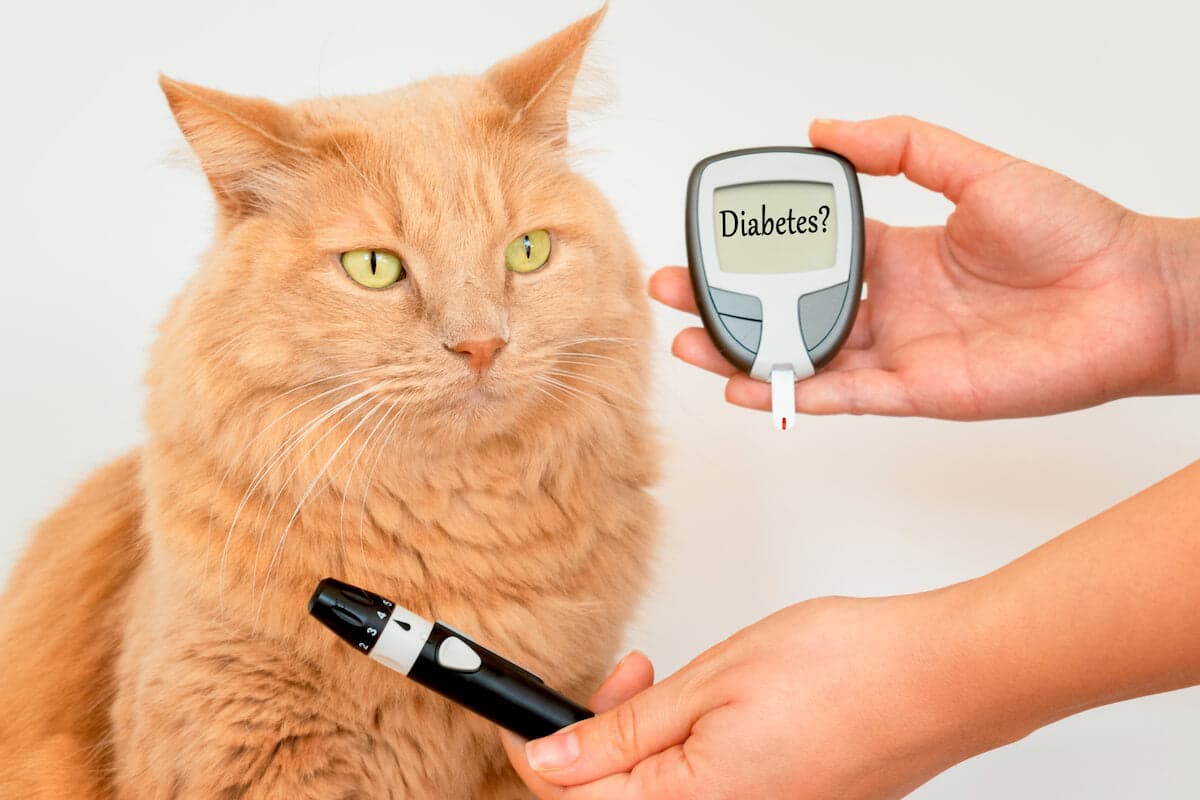Basepaws is looking for pet parents and their cats to participate in its feline diabetes mellitus (Type II) study. It's free to join and all that it requires is a simple and painless 10 second swab of your kitty's mouth! Don’t miss this opportunity to help us develop a new screening test for earlier detection of diabetes that could inform new approaches to intervention and treatment of this common feline endocrine disorder!
Diabetes in Cats
Diabetes mellitus is an endocrine system disorder that occurs as a result of the inability of the pancreas to regulate blood sugar. It is the second most common endocrine disorder (after hyperthyroidism) in cats. Similar to humans, the majority of affected cats suffer from Type II diabetes, where blood glucose levels are high because the cells in the body are unable to respond properly to insulin. Little is known about the genetic risk factors in feline diabetes; however, both human and feline Type II diabetes share environmental risk factors, such as physical inactivity and obesity, dry food diets, and taking corticosteroids.
Studies show that diabetes mellitus is commonly seen in Domestic Shorthair and Longhair cats, as well as the Burmese, Tonkinese, Russian Blue, and the Norwegian Forest Cat (see also Rand et al 2008 about overrepresentation of diabetes in Burmese cats in Australia, O’Neill et al. 2016 on Burmese in the UK, and Öhlund et al. 2015 on higher risk for diabetes in Burmese, Russian Blue, Abyssinian, and Norwegian Forest Cats in Sweden).

The Basepaws diabetes mellitus research program aims to better understand the genetic and oral microbiome factors associated with a cat’s increased risk for the disease. Research results could inform the development of an affordable at-home screening test that identifies a cat’s genetic predisposition to diabetes and any signs of active disease in a cat’s mouth.
Screening tools for earlier detection of diabetes can equip pet parents with a better understanding of the disease and help them to address it with their veterinarian before it reaches an advanced stage. They can also help streamline a veterinarian’s diagnosis and efforts to create an individualized treatment plan that will improve overall prognosis for cats affected by diabetes.
Genetics and the Oral Microbiome To Detect Diabetes
Recent genome wide association studies have identified several variations in DNA base pairs, known as single nucleotide polymorphisms (SNPs), that are strongly associated with the occurrence of feline diabetes mellitus. These SNPs have been located on the same chromosomes across genes that are also associated with diabetes in humans.
Researchers have called for a more detailed investigation of these regions and genes of interest to help confirm the associations and to detect new associations. To answer this call, Basepaws is working with research partner Anivive Lifesciences to explore the genetic variants associated with feline diabetes. This work will contribute to the body of scientific knowledge on feline diabetes that can be applied to proactive care efforts and individualized treatment approaches.
"Feline diabetes is a growing problem, but available treatments are expensive and rely mostly on symptom control through insulin therapy and dietary management. There is currently no clear understanding of the contribution of genetic factors to feline diabetes. Our work with Basepaws offers cat owners the opportunity to take a direct role in developing genetics-based precision medicine tools aiming to improve and extend the lives of diabetic cats."
—Anivive Chief Medical Officer David Bruyette, DVM, DACVIM
Basepaws’ feline diabetes clinical study is an opportunity to support the exploration of the genes and genetic mutations thought to be involved in feline diabetes (Type II), as well as the discovery of new genetic targets linked to the disease. To complement our feline diabetes clinical study with Anivive, we are also investigating diabetes-specific signatures in the feline oral microbiome. This is where you and your cat come in!
Become a Basepaws Citizen Scientist
Our citizen science feline diabetes study will be the first comprehensive investigation of the feline oral microbiome’s role in diabetes—a connection that has only been explored recently in human oral microbiome studies. Results of Basepaws’ citizen science study will inform the development of new screening tools for earlier detection of diabetes in cats, and potentially new or improved treatments for this common feline disease that could also have implications for therapeutic approaches to Type II diabetes in humans.
If you are in the U.S. and your cat has been diagnosed with Type II diabetes, please consider becoming a part of our citizen scientist program by filling out a Basepaws feline diabetes research application before May 31, 2022.
If your cat qualifies, Basepaws will send you an oral swab kit to collect their DNA sample (if we don’t already have it on file). We will ask you to fill out a short questionnaire and provide medical records from your veterinarian. Qualifying citizen scientists who are new to Basepaws will also receive a complementary Basepaws cat DNA test digital report as a thank you for your contribution to this important work!



